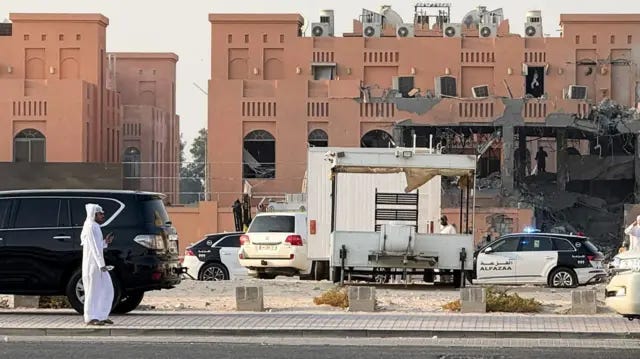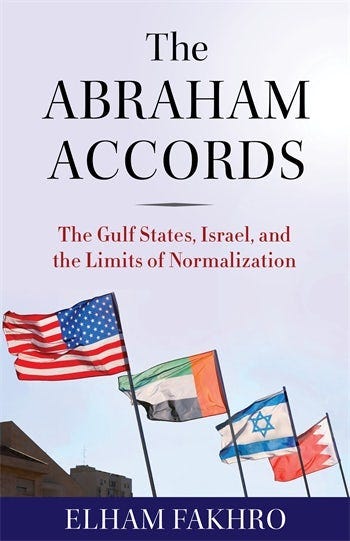The Gulf Nashra Weekly Digest
Israel Strikes Qatar and Leaves Casualties; Emergency Arab-Islamic Summit Held in Doha; Gulf Voices Discuss Repercussions.
Media Coverage
Geopolitics
“Israel targets Hamas leadership in Qatar strike.” CNN, September 10, 2025.
“Israel carried out an unprecedented attack against Hamas leadership in the capital of Qatar, which has been a key mediator in Gaza ceasefire talks — putting hostage negotiations at risk.”
Go Deeper: “Netanyahu gambled by targeting Hamas leaders in Qatar. It appears to have backfired.” ABC News, September 13, 2025.
“Trump says decision to strike Qatar was made by Netanyahu and not by US president.” Reuters, September 9, 2025.
“Trump said he directed U.S. envoy Steve Witkoff to warn Qatar the attack was coming but that it was too late to stop the strike. However, Qatar contradicted such claims from the White House, saying reports it got a heads-up before the attack were false and a phone call from a U.S. official came when blasts were already being heard in the Qatari capital, Doha.”
Go Deeper: “Qatar bombing tests the limits of the Trump-Netanyahu alliance.” Reuters, September 11, 2025.
“Trump meets with Qatari prime minister after Israeli strikes in Doha.” The Hill, September 13, 2025.
“The White House confirmed the two leaders had dinner late Friday in New York, but did not offer further details. Trump’s special envoy Steve Witkoff was also attended the dinner.”
Go Deeper: “Trump tries to distance U.S. from Israel’s strike on Qatar amid fury from Arab leaders.” PBS, September 11, 2025.
“Saudi Crown Prince says Gaza belongs to Palestinians, condemns Israel attack on Qatar.” Alarabiya, September 10, 2025.
“Crown Prince Mohammed bin Salman said in a televised address on Wednesday that Gaza is Palestinian land and the rights of its people ‘cannot be taken away by any aggression. The brutal aggression against the sisterly state of Qatar requires Arab, Islamic and international action’ he said.”
Go Deeper: “Crown prince leads Saudi, Arab condemnation of Israel’s ‘criminal’ Doha attack.” Arab News, September 09, 2025.
“UAE summons deputy Israeli ambassador over attack on Hamas in Qatar.” Reuters, September 12, 2025.
“The UAE, the most prominent Arab country to normalise ties with Israel under the Abraham Accords, told David Ohad Horsandi ‘the continuation of such hostile and provocative rhetoric ...solidifies a situation that is unacceptable and cannot be overlooked’ the Emirati foreign ministry said in a statement.”
Go Deeper: “The Widespread Fallout of Israel’s Qatar Strikes.” Carnegie, September 11, 2025.
“Leaders gather for Arab-Islamic summit in Qatar after Israel’s Doha attack.” Aljazeera, September 14, 2025.
“Leaders from across the region are gathering in the Qatari capital to discuss a formal response to Israel’s strikes on Doha last week, which it said targeted Hamas leadership and reverberated through the Middle East and beyond.”
“The leaders will discuss potential ways they could take action to address Israeli aggression across the region.”
Go Deeper: “Arab and Islamic summit in Doha to highlight seriousness of Israel's attack on Qatar.” The National, September 13, 2025.
Market & Economy
“Oil prices didn’t rally much after Israel’s attack in Qatar. What that says about the crude market right now.” Market Watch, September 9, 2025.
“For oil prices to rise, it will take near-term decline in global oil supplies or a larger-than-expected increase in global oil demand due to current low oil prices,” said Thummel. That could happen in the U.S. if a larger-than-expected interest-rate cut by the Federal Reserve boosts economic growth to levels greater than forecasted, he noted.
Go Deeper: “Oil prices jump more than 2% amid Opec+ output boost.” The National, September 12, 2025.
“Saudi Arabia's Vision Invest enters Africa with ARISE IIP investment.” Reuters, September 11, 2025.
“Saudi Arabia's Vision Invest took part in a $700 million capital raise by pan-African industrial zone developer ARISE Integrated Industrial Platforms, ARISE IIP said on Wednesday.”
Go Deeper: “What is driving the heavy investment in Africa by the Gulf States?” Investing African Mining INDABA, July 16, 2025.
“Qatar real estate sales hit $108m in first week of September 2025.” Arabian Business, September 11, 2025.
“Qatar’s real estate market recorded QR394,349,422 ($108.3m) in trading volume for sales contracts during the week of August 31 – September 4, 2025, according to the Department of Real Estate Registration at the Ministry of Justice.”
Go Deeper: “Qatar real estate sales reach $108m in early September.” Arab News, September 11, 2025.
“BlackRock-led group in talks to raise around $10.3 billion for Aramco deal, sources say.” Reuters, September 10, 2025.
“Under the deal, a newly formed subsidiary, Jafurah Midstream Gas Company (JMGC), will lease development and usage rights for gas processing facilities around the Jafurah gas development and lease them back to Aramco for 20 years.”
Go Deeper: “Beyond the barrel: How Aramco is reinventing energy production for a new era.” Arab News, May 16, 2025.
Domestic Issues
“Oman to receive electricity connection boost after $500m GCC grid deal.” Arab News, September 12, 2025.
“The GCC Interconnection Authority and Sohar International Bank have signed an agreement for the project, which includes the construction of a double-circuit 400 kilovolt power line linking the UAE’s Al-Silaa station and a station that the Authority will build in Oman.”
“Fitch affirms Kuwait's rating at 'AA-' with stable outlook.” Kuwait Times, September 6, 2025.
“The agency noted that Kuwait’s rating remains supported by one of the strongest sovereign balance sheets among rated countries, with net foreign assets projected to reach 607 percent of GDP in 2025, up from 576 percent in 2024.”
Go Deeper: “Fitch Affirms Kuwait at 'AA-'; Outlook Stable.” Fitch, Sep 5, 2025.
Gulf Opinions
This week, Qatari commentators turned their attention to Israel’s unprecedented strike on Doha on September 9, 2025. Faleh bin Hussein Al Hajeri, editor-in-chief of Al-Arab, emphasized that there has been exceptional solidarity with Qatar regionally and globally, noting that “the assault did not succeed in isolating Qatar; on the contrary, it unified ranks behind it.” He argued that Qatar’s resilience has placed the world before “a difficult moral test,” whether international law will remain “mere ink on paper” or evolve into an effective tool to protect smaller states. Similarly, Ibrahim bin Hashim al Sada stressed that the attack signals a wider Arab crisis, since Israel only understands “the language of deterrence” and will continue to violate sovereignty unless confronted with power. For him, the Gulf’s control over global energy and trade must be leveraged to restrain Israel’s recklessness. Shaika Al Khater added that this strike is not just another phase of the Gaza war but a “dangerous new chapter,” as Israel for the first time has attacked a U.S. partner in the Gulf, striking at Washington’s own mediation channels. Abdelraheem Alhour reinforced this point by calling the incident a “crystal clear example of the failure of the international system,” one that demonstrates its “illegitimacy.” In the same vein, Khaled Al Shafi noted that by attacking Qatar—a state entrusted with the U.S.-backed mediation—Israel revealed itself once again as the principal obstacle to peace, unwilling even to allow others to facilitate dialogue.
Gulf voices echoed this solidarity across the region, offering varied perspectives on both the meaning and consequences of the strike. Kuwaiti commentator Dahem Al Qahtani argued that Qatar is “unique,” not merely as an energy exporter, but as the product of “a self-made civilizational project rooted in Qatari, Arab, and Islamic values.” This authenticity, he maintained, gives Doha credibility as a mediator and explains why it has become a direct target for Israel, which seeks to undermine independent models of sovereignty. From the UAE, Abdullah Al Hashmi stressed the deliberate “timing” of the operation, coinciding with difficult negotiations led by Qatar alongside the U.S. and Egypt to halt the war in Gaza. In his view, striking Doha was effectively a blow to the mediation track and “a double-edged message”—to Hamas, that its leadership is “not safe even abroad,” and to Qatar, that its mediating role could be threatened or discredited.
Saudi columnist Khalid Al Sulaiman interpreted the strike as a clear indicator of “how far Netanyahu’s government is willing to overstep.” Whereas past attacks were often justified under the pretext of operating in “conflict zones,” he argued, targeting a mediating state actively engaged in peace negotiations represents an escalation that “cannot be justified.” Bahraini commentator Moanes Almardi offered a more structural perspective, suggesting that the incident could accelerate the decline of “single-state” mediation in favor of collective arrangements involving Egypt, Turkey, and even the United Nations, with Qatar remaining a central player. He noted that the international backlash over the violation of Qatari sovereignty might push Israel to show “greater urgency and flexibility in securing a temporary ceasefire and prisoner exchange.” Finally, Omani writer Khaled bin Salem Al Ghassani highlighted the constraints facing Doha: it cannot sever its strategic ties with Washington or risk an open confrontation with Israel. Yet, he argued, Qatar can still recalibrate the balance by raising the costs of Israeli policy, whether through intensifying political and media support for the Palestinian cause or by strengthening partnerships with regional and global actors such as Turkey, Iran, Russia, and China.
Nashra Picks
Book: Elham Fakhro “The Abraham Accords: The Gulf States, Israel, and the Limits of Normalization.” Columbia University Press, November 12, 2024.
Analysis: “Resilience and Roadblocks: The Abraham Accords at Five Years.” Victoria Coates, David Makovsky, The Washington Institute For Near East Policy, September 11, 2025.
Analysis: “Israel’s Strike on Qatar: Gulf Experts’ Perspectives.” Gulf International Forum, September 11, 2025.
Analysis: “Israel has replaced Iran as the biggest security threat to the Gulf states.” Sanam Vakil, The Guardian, September 11, 2025.
Analysis: “Israel Has Tried to Kill Hamas Leaders in Qatar.” Mohanad Hage Ali, Carnegie, September 10, 2025.
Analysis: “Gulf Powers Question U.S. Protection After Israeli Attack on Qatari Soil.” Vivian Nereim, New York Times, September 10, 2025.
Analysis: “From Partner to Threat: Israel’s Shift in the Gulf.” Dubai Public Policy Research Center, September 10, 2025.
Analysis: “Israel Strikes Qatar: Implications for Gaza Diplomacy, Gulf Relations, and U.S. Policy, Robert Satloff, Elizabeth Dent, Simon Henderson, David Makovsky, The Washington Institute For Near East Policy, September 10, 2025.
Analysis: “India-US Rift Boosts the Gulf’s Oil Leverage.” The Diplomat, September 10, 2025.
Analysis: “Israeli strike in Doha crosses a new line from which relations with the Gulf may not recover.” Kristian Coates Ulrichsen, The Conversation, September 10, 2025.
Analysis: “Striking a US Ally: Israel’s Attack on Qatar and the Erosion of Regional Stability.” Hanna Alshaikh, Charles W. Dunne, Khalil E. Jahshan, Tamara Kharroub, Yousef Munayyer, Kristian Coates Ulrichsen, Arab Center Washington DC, September 9, 2025.
Analysis: “Chameleon Diplomacy: Qatar and UAE Compete in the Horn.” Anderson, Daily Euro Times, August 26, 2025.
Research: Emma Soubrier “The Gulf defence industry, at the cutting (h)edge of multi-level power strategies.” Defense & Security Analysis, August 28, 2025.
Research: “Peace Is Relative: Qatar and Agreements with Israel.” Ariel Admoni, The Middle East Policy Council, October 31, 2021.
Podcast: “Did U.S. forces collude in the attack on Doha?” Ahmed Moulana and Mohamed Ounmash, Ihata Podcast, September 9, 2025.
Podcast: “Israel Bombs Qatar.” The rest is Politics, September 9, 2025.



